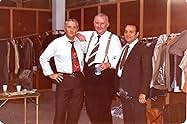The drama surrounding the dismissal of Mr. Gough Whitlam as the Labor Prime Minister of Australia, 1975 - by the then Governor General of Australia, Sir John Kerr, and the subsequent install... Read allThe drama surrounding the dismissal of Mr. Gough Whitlam as the Labor Prime Minister of Australia, 1975 - by the then Governor General of Australia, Sir John Kerr, and the subsequent installation, in Parliament.The drama surrounding the dismissal of Mr. Gough Whitlam as the Labor Prime Minister of Australia, 1975 - by the then Governor General of Australia, Sir John Kerr, and the subsequent installation, in Parliament.
- Awards
- 3 wins
Photos
Storyline
Did you know
- TriviaOne of three major film and television collaborations of actress Robyn Nevin and director Carl Schultz. The productions are the feature films 'Goodbye Paradise'' (1983) and 'Careful, He Might Hear You' (1983) and two episodes of the television mini-series 'The Dismissal' (1983).
- Quotes
Gough Whitlam: [referring to Opposition Leader Billy Snedden] Before the Leader of the Opposition can talk about leadership, let him serve his apprenticeship. Let him do some on-the-job training. Better still, let him do some adult re-training.
- ConnectionsFeatured in Four Corners: Lest We Forget (1985)
The key to its success on the first count is brilliant acting, although I was less impressed by Max Phipps' performance as Gough Whitlam than some other commenters here. The clear standouts for my money were John Stanton as Malcolm Fraser and Bill Hunter as Rex Connor. The latter must have been one of the easiest casting choices in history - Hunter could not have been more perfect for the role. On the second count, the series avoids the "myth of objectivity" trap through a narrator who articulates the sympathies of the director (Phillip Noyce, who more recently demonstrated his left-wing credentials in Rabbit Proof Fence), while being carefully even-handed and sympathetic in its dramatic portrayal of all parties. The adherence to the Lady Kerr/Lady Macbeth theme popular among Labor partisans was perhaps a little partial, though not ruinously so. In particular, credit is due for the sympathy shown to Kerr and the extraordinarily difficult position he was placed in, whatever one might think of his actions.
However, there is one sour note for which the producers were perhaps not entirely to blame - the portrayal of the Jim Cairns/Juni Morosi affair. Those who come to the series with no background to these events will get the impression that Cairns and Morosi were the innocent victims of a smear campaign by a prurient gutter press. The producers may have been restrained in this respect by Australia's stultifying defamation laws, and the recently demonstrated willingness of Cairns and Morosi to use them against those who suggested their relationship was sexual (which Cairns would eventually admit to a year before his death). However, more could have been made of the bizarre fashion in which Morosi managed Cairns's office as Treasurer.
Speaking of defamation, there are a couple of disorienting occasions where dialogue is obscured due to injunctions taken out by offended principals - by a beeping noise on one occasion, and a very loud telephone ring on another. A further curiosity: the DVD release excises a line from the comic relief scene where a customs officer (played by the late Paul Chubb) serves Tirath Khemlani on his arrival at Sydney Airport. Next in the queue is a dishevelled looking hippie, who now receives only a disapproving glare from Chubb when he presents his paperwork. In the original version, Chubb said something along the lines of: "drug bust in Bali, eh?". Obviously this line no longer rings true in the wake of the Schapelle Corby case, which dramatically illustrated that those busted for drugs in Bali can expect far worse than deportation.
- pollbludger
- Nov 2, 2006
- Permalink
Details
Contribute to this page























